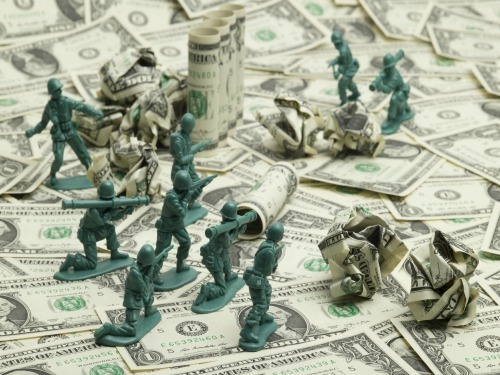Invest in commodities if the war comes

North Korea has always been treated as a threat to world peace, but previous administrations only sought diplomatic solutions with the country. Former presidents Clinton, Bush, and Obama all made peace treaties with North Korea, but current president Trump has instead chosen the nuclear option – literally. You don’t have to stop investing though, and you can invest in commodities to make some money through the chaos.
Already, the US has bombed Afghanistan and Syria in a show of military might, but North Korea still continued testing missiles. Even after being warned, the countries officials said they will keep testing and launching nuclear missiles and that they won’t give in to the US’ demands. In response, the US sent navy ships to the Korean peninsula, and this has got people worried.
There are increasing tensions around the world, and people are worried about a looming war. During times of war, holding on to cash is never advisable since the value of the currency in the warring country will drop. A simpler alternative is to convert the cash into another currency, but this does not count as an investment since value does not rise. A better alternative would be to invest in commodities, which will be in higher demand, and some you can look at include:
Soft commodities
Some of the things that will be most in demand during war are agricultural products – food. There isn’t a single country that produces all the food they need, and they rely on imports from other countries. If there were a war going on, food shortages are very likely, and this can be demonstrated by food rationing during the first world war in Europe. While this may be a bad situation, it’s also an investment opportunity given the high food prices.

Among soft commodities, wheat is crucial during times of war because wheat flour is used to make most dishes. If there were a war right now, you would see the value of wheat futures skyrocket as the production of the crop reduced. You can also invest in commodities like corn and cattle, which also have futures that will rise in value during war time.
Metals
War requires plenty of metals, from the lead that makes the bullets to the steel that makes the structures used in war and the transportation machines. In short, a lot of metals will be in high demand, and their prices will go up. Investing in these metals will be a great strategy that promises huge returns throughout the war. What’s more, they will still be in demand after the war as the warring countries rebuild their infrastructure at home. This makes metals a great investment opportunity during and after a war.
Gold
For its intrinsic value, gold will always be the go-to commodity in times of uncertainty. War is certainly an uncertain time. However, the problem with investing in gold comes with handling the actual physical product.

In times of war, people will turn to criminal activity to survive in a place lacking basic necessities. Naturally, this would make your pot of gold a target for these people. However, if you can keep your gold safe through a time of war, it can be an excellent commodity to invest in.
Otherwise, you can still choose gold futures or CFDs if you don’t want the physical product. The only problem with this is that you can’t really know when the war will end, so you might end up having to receive physical gold when the futures contract expires. That will take you back to the insecurity part of the investment.
Silver serves a similar function as gold and it, too, will gain in value as people ditch cash and look to invest in commodities with intrinsic value.
Other sectors to invest in commodities
Besides commodities, stocks and bonds also don’t decrease in value despite there being a war. For these, however, you need to be cautious not to buy assets in the losing country because then you lose all your investments.


























Comments (0 comment(s))